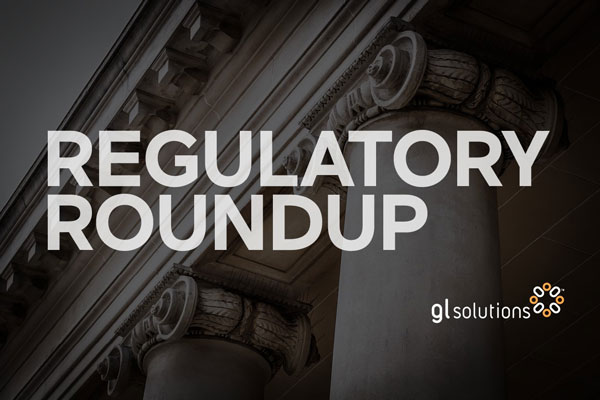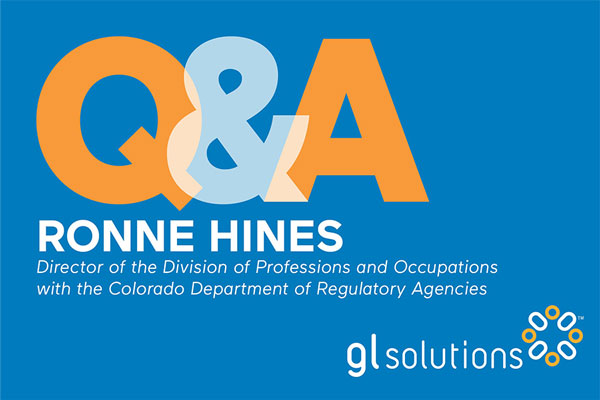Ronne Hines is director of the Division of Professions and Occupations with the Colorado Department of Regulatory Agencies (DORA). She also serves as president of the Council on Licensure, Enforcement & Regulation (CLEAR). She recently agreed to answer questions about several issues affecting regulatory agencies. We’d like to thank her for participating.
This interview does not constitute a product endorsement.
Q: How long is your appointment as president of CLEAR, and when will it end?
A: My term as CLEAR president will end at the close of the 2022 annual educational conference, scheduled for Sept. 14-17 in Louisville, Ky.
Q: I’m guessing your positions with CLEAR and DORA have given you a unique perspective on the challenges the COVID pandemic has created for professional licensing agencies in the United States and elsewhere. What are the challenges the pandemic created for almost all agencies, and what are some of the things that characterize agencies that adjusted successfully?
A: Colorado Gov. Jared Polis directed the Colorado Department of Regulatory Agencies (DORA), including the Division of Professions and Occupations (DPO), to act swiftly when it became clear that COVID-19 would have a lasting impact on the state. In an effort to address shortages in the medical profession, one of the first actions taken was to allow individuals in the healthcare field who either hold licenses in other states or who have allowed their license to expire in Colorado to immediately resume work within their scope of practice, provided their out-of-state or expired license is/was in good standing. Additional executive orders allowed medical professionals to work outside the scope of their typical practice as long as their training and experience matched their work. As an agency, we focused on communicating changing executive orders and emergency rules to affected professions and processing applications as quickly as possible to ensure that needed roles were filled. We also worked to move inspections to video platforms where possible and to ensure that inspections that could not be done remotely were conducted safely and efficiently.
Q: In response to the pandemic, many changes affecting licensed businesses and occupations were adopted seemingly overnight: take-out mixed drinks, expanded scopes of practice, greater access to telemedicine, the list goes on. Which of these are likely to endure, and which are likely to prompt policymakers to look back and say, “I can’t believe we did that?”
A: We have made some improvements in efficiency and consistency that will continue long after the pandemic. Some of the advancements we have made in remote inspections, for example, will continue, as they have proven to be beneficial and effective.
Q: CLEAR has issued a call for proposals for next year’s conference. One of the suggested topics is “Lessons learned from the pandemic.” What are lessons licensing agencies have learned from the pandemic that are likely to prove beneficial going forward?
A: Some of the most successful measures Colorado has undertaken are similar to other licensing agencies. For Colorado, these include:
- The measures taken to ensure nursing and nurse aide students can continue to advance in their education and training have been very successful in maintaining and expanding the state’s health care workforce. Many nursing students in particular would not have been able to complete their education and training without these measures, and thus would have been prevented from entering the healthcare workforce at a time when the state needed as many healthcare workers as possible.
- The expanded scope of practice to allow for broader administration of the COVID vaccine has been highly successful. Colorado is currently above the national average for adults who are fully vaccinated.
- The expansion of telehealth has been successful and accelerates a trend that was already underway pre-pandemic.
Q: It seems that employers everywhere are experiencing staffing problems. To what degree are licensing agencies suffering from staff shortages, and what are they doing to adjust?
A: One of things that DPO has implemented to combat staffing shortages is a Strengths, Weaknesses, Opportunities, Threats (SWOT) Team. This team is cross-trained to help any unit in the division should they experience staff shortages or a sudden increase in workload. In addition, the SWOT team also develops policies and procedures to ensure consistency and process streamlining throughout the division and conducts audits to ensure that procedures are being followed. This helps to ensure a consistent customer experience, regardless of license type.
Q: In addition to COVID, licensing officials in many states are facing regulatory-reform initiatives. Are these becoming more common, or does it just seem that way?
A: Regulatory reform is a common topic for licensing agencies, including finding approaches for streamlining mobility. Although I wouldn’t say these initiatives are becoming more common, I would also point to Colorado’s leadership in reviewing licensing and regulatory policy. In particular, the Colorado Office of Policy Research and Regulatory Reform conducts sunrise reviews (which look at whether an occupation or profession should be regulated) and sunset reviews (which evaluate if an existing regulation or part of government is still needed, and aims for the least restrictive level of regulation consistent with the public interest).
Q: How do you believe this push for reform will evolve over the next few years?
A: The National Council of State Legislatures (NCSL) recently identified four focus areas where regulatory reforms are likely: improving access to licensed occupations for veterans and military spouses; improving employment in licensed occupations for individuals with criminal records; improving access to licensed occupations for low income, unemployed and dislocated workers; and improving access to licensed occupations for immigrants with work authorization. Recent examples of legislative activity in this fourth area can be found on NCSL’s website.
Q: In preparation for next year’s conference, CLEAR also has issued a call for proposals on the topic of “Embracing the positive aspects of regulatory reform.” In your view, what are some of the positive impacts of regulatory reform as well as some of the negative impacts?
A: Regulatory reform allows us to make changes that positively affect our licensees and our processes. As mentioned above, we have seen several reforms take place that were initially responses to an emergency, but that have ended up identifying efficiencies that will influence our efforts going forward.
Q: What keeps regulatory board executive directors up at night these days?
A: I think that regulatory board executive directors have a lot to consider in this changing environment. Although we have pivoted and proven our ability to be nimble in response to emergencies, we continue to focus on issues before us — maintaining and adapting our organization to continue to meet the needs of our customers, aiding and participating in policy discussions to resolve/address workforce shortages, and most importantly ensuring consumer protection.
Q: Is there a question you think we should have asked but didn’t?
A: I just want to close by reiterating that the most important part of our mission remains protecting consumers, and I believe we can do that while also finding ways to break down regulatory barriers and help Colorado (and the nation’s) economy thrive.
Learn more
GL Solutions helps governments run, grow and adapt. Learn more on our website.


